Donaueschingen awards 82 Rio 2016 Paralympic quota places
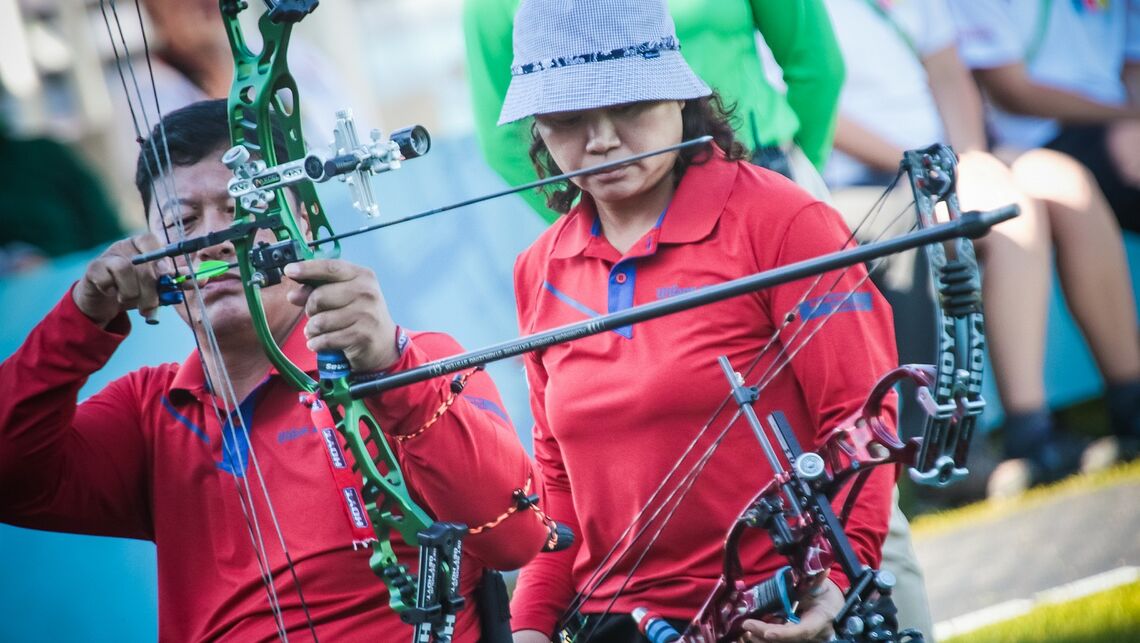
Last update: 9:45am UTC+2 30 August 2015.
The Donaueschingen 2015 World Archery Para Championships acted as the primary qualifying tournament for the Rio 2016 Paralympic Games. Places were available in both the mixed team competition and individual events.
Each top-four (semifinalist) mixed team won two places, one men’s and one women’s, for their nation to attend the Paralympics. Further places were available to the nations represented by top individual finishers.
Country-by-country, here’s which nations won places – and how they did it.
- Australia
- Brazil
- China
- Czech Republic
- Finland
- France
- Germany
- Great Britain
- Greece
- IR Iran
- Iraq
- Italy
- Korea
- Latvia
- Mongolia
- Poland
- Russia
- Slovakia
- South Africa
- Spain
- Switzerland
- Thailand
- Turkey
- Ukraine
- USA
Australia  – 1 place
– 1 place
Compound men’s open athlete Jonathon Milne made the last 16, taking Australia’s first quota place in Donaueschingen.
Compound open: 1 (1 man)
Brazil  – 4 places
– 4 places
Brazil receives a host country place to Rio in each category it entered an athlete into at Donaueschingen 2015. The first positions won as athletes in the normal qualification procedure, in each category, returned the host country place to the bipartite pool. Brazil could qualify additional athletes.
Francisco Cordeiro upset the Polish 16th seed Piotr Sawicki in the recurve men’s open third round, after qualifying in 48th position to win a first athlete place. Jane Karla Gogel’s eighth place compound women’s open finish collected a second – then Fabiola Lorenzi Dergovics added a third in the recurve women’s open Paralympic secondary tournament.
Brazil retained its compound men’s open host country place.
Compound open: 2 (1 man – host country, 1 woman); recurve open: 2 (1 man, 1 woman)
China  – 10 places
– 10 places
Six-nil over Rio host team Brazil then a 5-1 over Donaueschingen host team Germany put the number-one seeded Chinese recurve open mixed team into the top four, and their pair of Rio places – while, at the same time, China’s W1 pair had a 32-point win over Italy in the W1 quarterfinals to take two spots there, too.
The nation’s recurve men’s open quota was completed when Yu He and Zhao Lixue both made it into the last 16 of the individual competition. Gao Fangxia added a second women’s by winning the Paralympic secondary tournament.
A 155-153 win over Russia’s mixed team secured two compound open spots. China did not miss the 10-ring through the first eight arrows of the match and never looked without control. One phase earlier, the Chinese pair had set a new match world record for the category of 157 points – and went on to win the world title in Donaueschingen.
The gold medal opened up another spot for China as world champions added an extra quota for the victorious nation in women’s competition, according to the selection procedure. That went to Zhou Jiamin, who finished sixth individually.
A similar situation occured in the W1 women’s event, which Guo Ying won. A second quota place was awarded to China via Zhang Lu, individual fourth-place finisher.
Compound open: 2 (1 man, 2 woman); recurve open: 5 (3 men, 2 women); W1: 3 (1 man, 2 woman)
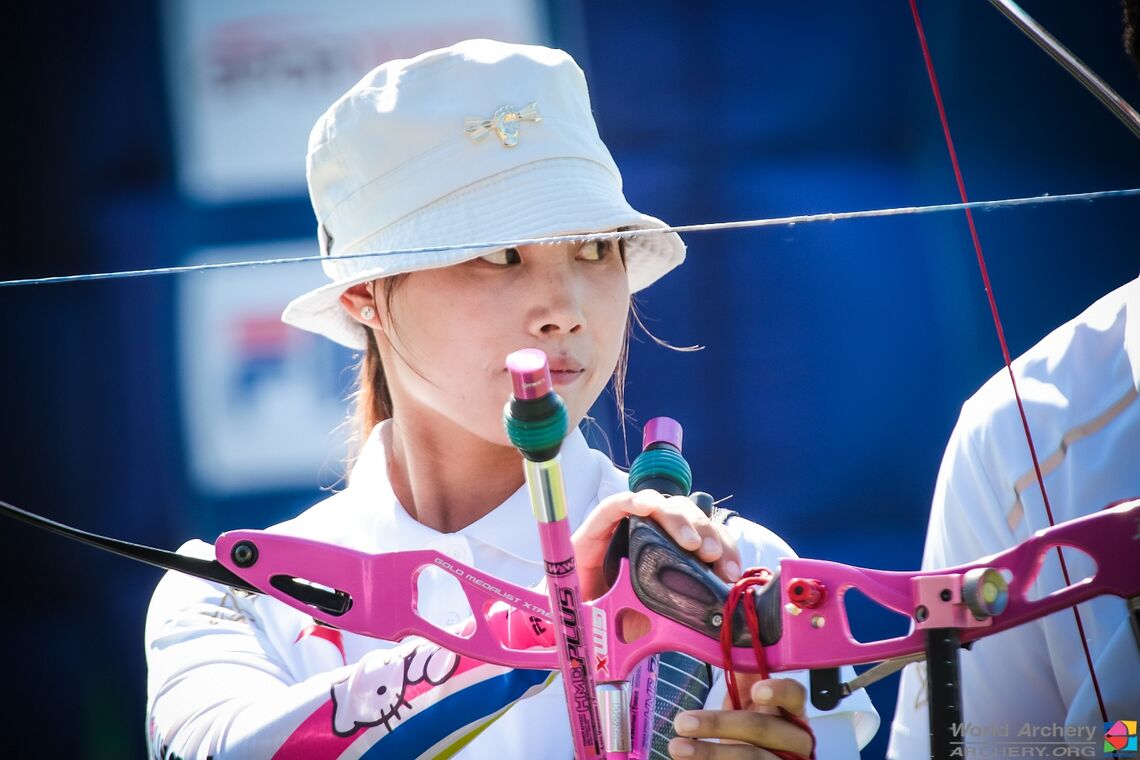
Czech Republic  – 1 place
– 1 place
Beijing 2008 Paralympic Champion and runner-up at London 2012, top seed David Drahoninsky landed an anticipated, and expected, quota place when he cruised into the W1 men’s quarterfinals, on the way to winning his first world title.
W1: 1 (1 man)
Finland  – 2 places
– 2 places
Jere Forsberg took a 140-131 victory over Canada’s Alec Denys in the compound men’s open third round to win Finland’s first confirmed Rio 2016 quota place. Defending World Champion Jean Pierre Antonios added the W1 men’s spot by making the last eight.
Compound open: 1 (1 man); W1: 1 (1 man)
France  – 2 places
– 2 places
The third round of the compound men’s open eliminations saw Eric Pereira beat the Czech Republic’s Leos Bartos to win a first French place at the Paralympics in Brazil.
Defending world champion Brigitte Duboc won a second spot when she took a 6-2 win in the third round of the recurve women’s open event.
Compound open: 1 (1 man); recurve open: 1 (1 woman)
Germany  – 2 places
– 2 places
Host country of the Donaueschingen 2015 World Archery Para Championships, Germany had to wait until late in the individual events to secure its first Rio place and Jennifer Hess in the recurve women’s open competition, with a 7-1 win in the third round.
A second came when Uwe Herter qualified for the quarterfinals of the W1 men’s competition.
Recurve open: 1 (1 woman); W1: 1 (1 man)
Great Britain  – 9 places
– 9 places
The top-ranked GBR W1 mixed team had an automatic bye into the semifinals – in an event with only seven teams competing. Jo Frith and John Walker’s strong qualification got the nation its first two places to the Games.
Athens 2004 Paralympic Champion John Cavanagh made the Brit’s W1 quota count three by making the top eight in individual competition. The count soon reached the maximum, four, when the mixed team collected the world title, freeing up a second individual space in the W1 women’s event as, according to qualification procedure, the world champion in the category won a reserved space for the nation. Jessica Stretton’s bronze medal secured that spot.
Two compound open spots were added when John Stubbs and Mel Clarke posted an eight-point win over Spain in the mixed team quarterfinals. The British pair only squeaked past Slovakia by a point in the first round – 146-145 – then put up a 154-point match to make the semifinals and win those vital Paralympic places.
A second compound men’s open spot came courtesy of Michael Hall’s third round win over Iraq’s Shakir Khalef, 139-137.
David Phillips collected the first of two recurve quota places with a third-round win, 7-1, over Ireland’s Barry Guider. The second came in the Paralympic secondary tournament, when Tania Nadarajah beat Lin Dandan in a shoot-off for the third and last available place.
Compound open: 3 (2 men, 1 woman); recurve open: 2 (1 man, 1 woman); W1: 4 (2 men, 2 woman)
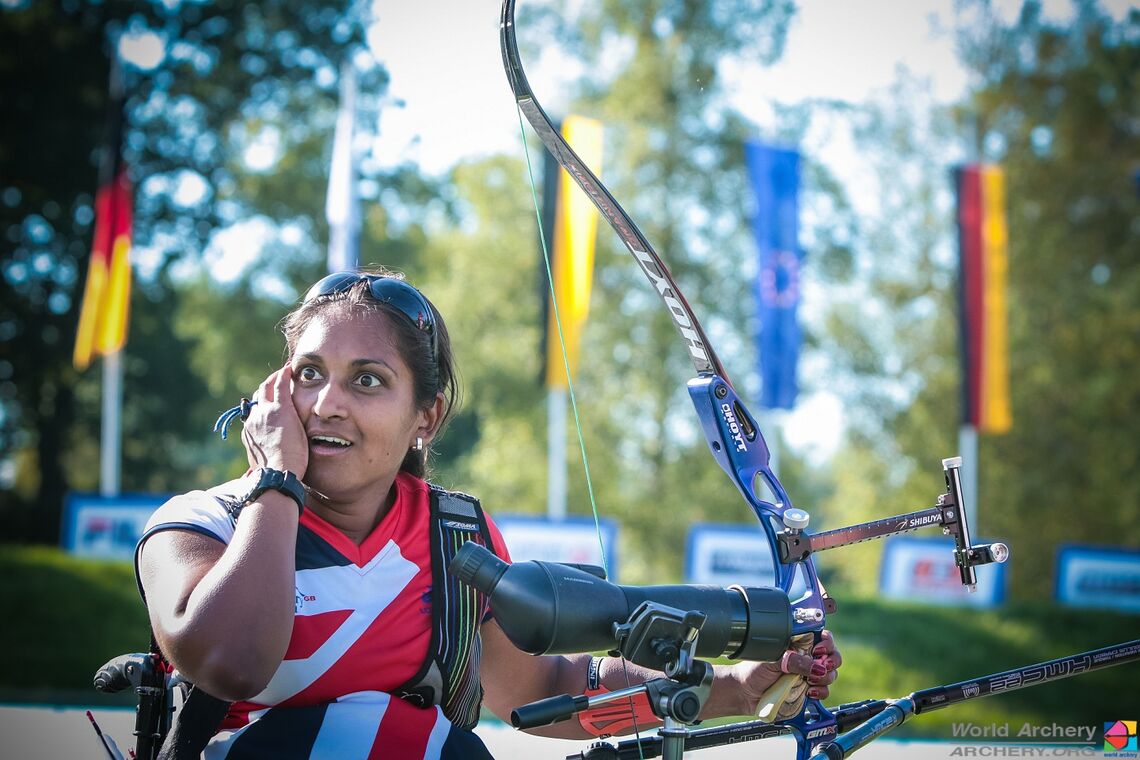
Greece  – 1 place
– 1 place
Eleventh seed Dorothea Poimenidou won her third round match in the recurve women’s open category in straight sets. The 6-0 victory, over Brazilian athlete Thais Silva Carvalho secured Greece a first Rio Paralympic place.
Recurve open: 1 (1 woman)
IR Iran  – 4 places
– 4 places
Hadi Nori won a quota place by beating Turkey’s Erdogan Aygan in the compound men’s open third round.
Iran’s recurve open athletes did better in the individual competition: In the last 16s, Mohadeseh Kohansal, Gholamreza Rahimi and Turin 2011 World Champion Ebrahim Ranjbarkivaj all remained standing. All three won Rio individual quotas: Mohadeseh in the women’s competition, her teammates in the men’s.
Compound open: 1 (1 man); recurve open: 3 (2 men, 1 woman)
Iraq  – 1 place
– 1 place
An upset courtesy of 26-ranked Jawad Al-Musawi, who beat the seventh seeded recurve men’s open athlete, Italian Roberto Airoldi, in the third round, brought Iraq its lone quota place.
Recurve open: 1 (1 man)
Italy  – 7 places
– 7 places
Despite admitting at the start of the week she had a shoulder injury and her expectations for the event were lower than usual, Elisabetta Mijno, paired with Roberto Airoldi, had no trouble dispatching Ukraine and Great Britain in the recurve open mixed team event. The first win was 6-0, the second 6-2. Just two set points lost over two matches, in return for two Rio spots.
Italy’s compound open pair beat quarterfinal-opponent Canada, who – in turn – had beaten the defending champs Turkey in the first round. In the first two matches of the brackets, the second of which won the quota places, top-seeded Alberto Simonelli and Eleonora Sarti scored 153 for the 16-arrow match. Matteo Bonacina and Gianpaolo Cancelli completed the three-athlete maximum quota when they both won their third-round individual matches, against Ivan Dziadyk and Matt Stutzman, respectively.
Fabio Azzolini won the W1 men’s space with a two-point victory over fifth seed Peter Kinik of Slovakia in the division’s last-16 round. Azzolini was ranked number 12.
Compound open: 4 (3 men, 1 woman); recurve open: 2 (1 man, 1 woman); W1: 1 (1 man)
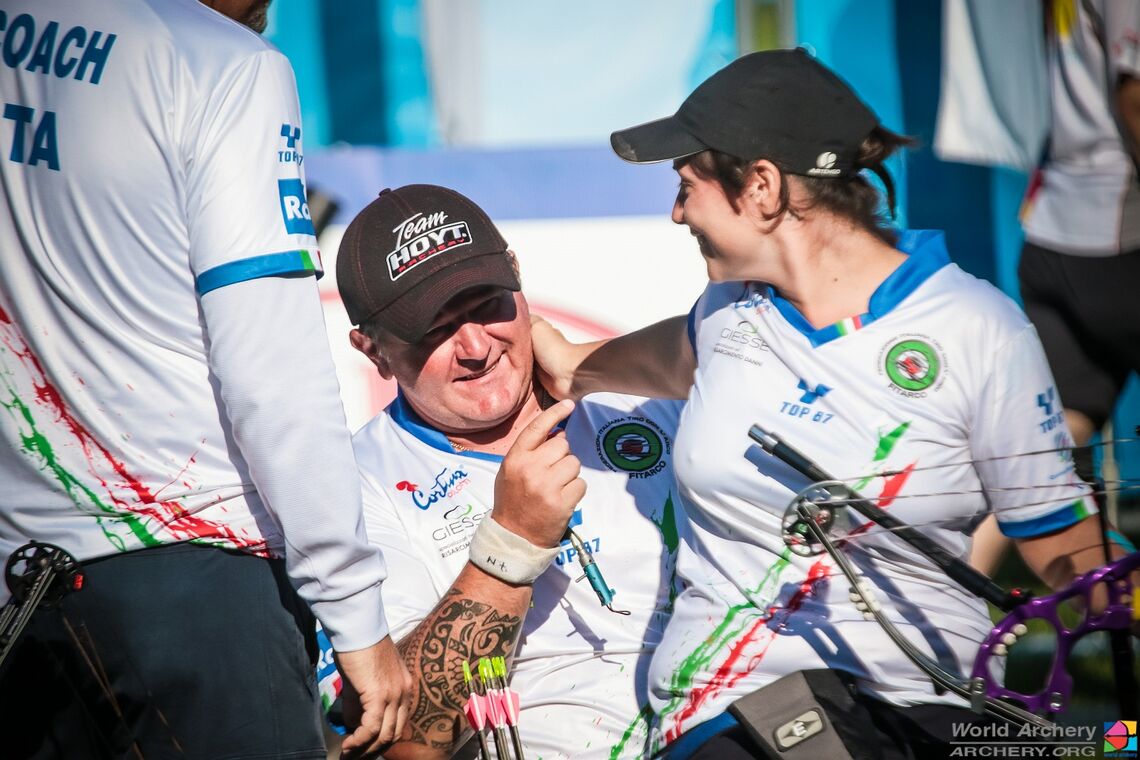
Korea  – 7 places
– 7 places
After seeing off Chinese Taipei in the first round, Korea needed a full four sets to knock-out Iran, minus national legend Zahra Nemati, in the recurve mixed team quarterfinals. The Korean pair never dropped below 33 points for the four-arrow set. A draw, 35-all, in the fourth, sealed a 5-3 win – and the vital top-four berth.
The nation’s recurve men’s open quota was upped to three, courtesy of Kang Ki Seong and Lee Myeong Gu’s win in the last 32 elimination phase. (Lee Hong Gu, who helped win the mixed team place, went out that round.)
Seeded third, Korea’s compound open mixed team beat number six ranked Ukraine to make the last four, 151-142.
Although Kim Ok Geum couldn’t grab a W1 space in the mixed team competition, a loss in the quarterfinals was all she needed to take one of the four individual places available. (The number was increased from three as there was no W1 competition at the Para Pan Ams.)
Compound open: 2 (1 man, 1 woman); recurve open: 4 (3 men, 1 woman); W1: 1 (1 woman)
Latvia  – 1 place
– 1 place
After qualifying third, Ieve Melle had to win just one match to secure Latvia a recurve women’s open quota place. She beat Marketa Sidkova in straight sets.
Recurve open: 1 (1 woman)
Mongolia  – 1 place
– 1 place
Dambadondog Baatarjav, who qualified in 41st, made the last 16 with a win over ninth seed Lee Hong Gu in recurve men’s open competition to secure a Rio place.
Recurve open: 1 (1 man)
POLAND  – 2 places
– 2 places
Poland’s place came when Milena Olszewska, silver medallist at the 2014 European Para Archery Championships, shot a last-set 29 to win her third round match in the recurve women’s open competition.
Piotr Sawicki then won a highly-competitive Paralympic secondary tournament in the recurve men’s open category. Fourteen third-round losers competed for just a single remaining Rio 2016 quota place. He needed five sets in the quarterfinals, won 6-2 in the semis – then beat Japan’s Takahiro Hasegawa in the final, to take the spot.
Recurve open: 2 (1 man, 1 woman)
Russia  – 10 places
– 10 places
Ranked second in the recurve open mixed team competition, top individual qualifier Bato Tsydendorzhiev and Margarita Sidorenko beat Turkey then Thailand, surrendering only a single set point in the process. The semifinal berth, won after that second match, got Russia the Rio places.
Sidorenko’s women’s open teammates, Svetlana Barantseva and Irina Rossiyskaya, completed the three-athlete maximum quota with third-round wins over Natalie Wells and Lee Yun-Hsien, respectively.
In the same round, Sergey Khutakov and Anton Zaypaev added a second and then third men’s place – to complete Russia’s recurve men’s quota, too.
The nation’s W1 mixed team had a 28-point victory over the Czech Republic in the quarterfinal to make the qualifying top four.
A compound men’s open Rio spot was won by Russia in the Paralympic secondary tournament. Ivan Kozlov lost his semifinal to Martin Imboden, but then went into a third-place playoff for the final available Paralympic place. He beat Germany’s Michael Muller and collected the spot.
London 2012 bronze individual medallist Stepanida Artakhinova went out early in the Donaueschingen 2015 compound women’s open eliminations. She rallied, recovered and blew through the secondary tournament, shooting a matchplay world record in the process – and claiming the last remaining Rio 2016 invitation in the category at the event.
Compound open: 2 (1 man, 1 woman); Recurve open: 6 (3 men, 3 women); W1: 2 (1 man, 1 woman)
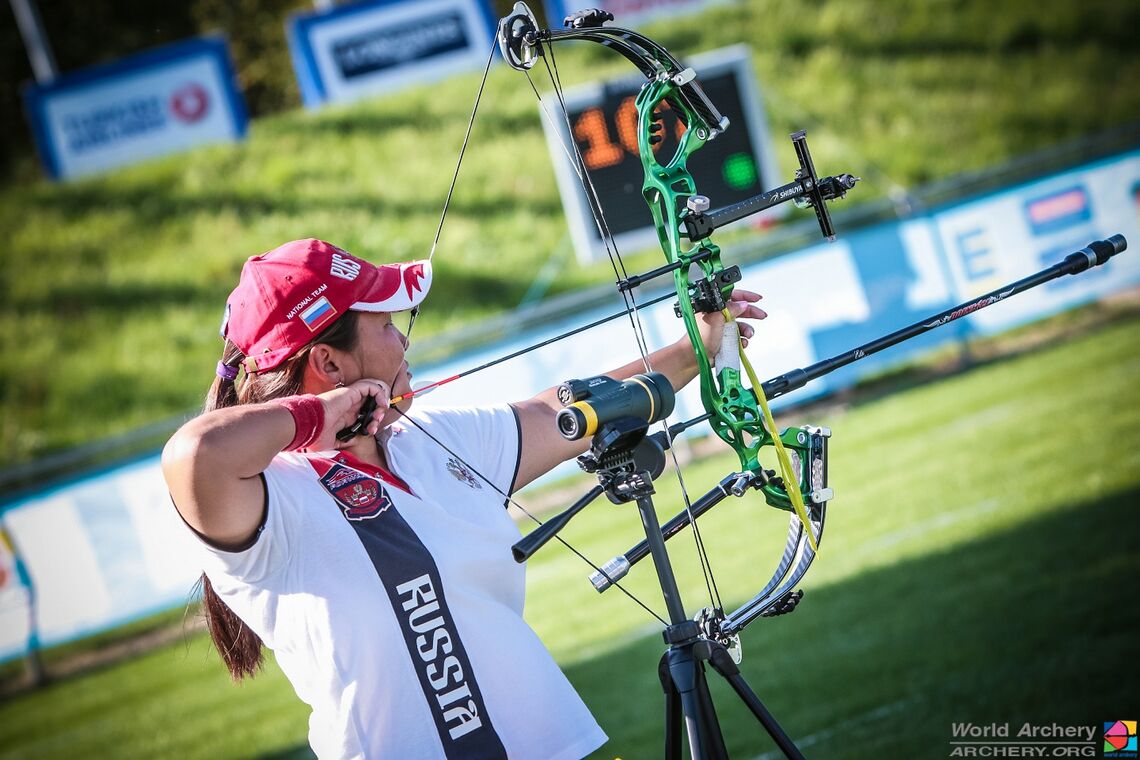
Slovakia  – 1 place
– 1 place
Third seed Marcel Pavlik had one match to win to get a Rio quota place in the compound men’s open competition for Slovakia. He posted a phase-high 144 to beat Chen Boping of China, and won the spot.
Compound open: 1 (1 man)
South Africa  – 1 place
– 1 place
A well-earned victory over sixth seed Martin Imboden, from Switzerland, put 27-ranked qualifier Stephanus Lombaard into the last 16 of the compound men’s open competition and with a Paralympic quota position in the bag.
Compound open: 1 (1 man)
Spain  – 1 place
– 1 place
A seventh place in the W1 women’s individual competition was enough for Liliana Oliveros to take a quota place, thanks to the effects of the earlier mixed team competition on the rankings.
W1: 1 (1 woman)
Switzerland  – 1 place
– 1 place
Martin Imboden, former world record holder for the 72-arrow qualification round, won the Paralympic secondary tournament after being knocked out in the last 32 of the world championships. He won his semifinal by three points to claim the place, then – in a match with no direct impact on qualification – confirmed it: A seven point victory and a Rio invitation secured for Switzerland.
Compound open: 1 (1 man)
Thailand  – 1 place
– 1 place
Wasana Khuthawisap won a quota place by making the last 16 of the recurve women’s open competition.
Recurve open: 1 (1 woman)
Turkey  – 3 places
– 3 places
Twelfth seed Bulent Korkmaz knocked out Swede Pierre Claesson by a point in the compound men’s third round, winning Turkey’s first Rio place in the process. One phase later, Handan Biroglu added a women’s spot by beating Kerrie-Louise Leonard and making the quarterfinals.
A second compound men’s open spot came in the Paralympic secondary tournament, courtesy of Erdogan Aygan, who finished second.
Compound open: 3 (2 men, 1 woman)
Ukraine  – 2 places
– 2 places
Both Roksolana Dzoba-Balyan and Iryna Volynets collected Ukraine recurve women’s open quota places by making the last 16 of the Donaueschingen competition.
Recurve open: 2 (2 women)
USA  – 7 places
– 7 places
A quarterfinal mixed team win over Korea, 142-136, put the States pair into the semis and secured the nation two W1 Rio places.
Andre Shelby and Ben Thompson added a second and then a third quota place for the USA in the compound men’s open competition. The pair beat Poland’s Marek Kantczak and Aleksander Zubar, of Russia, respectively, in the third round.
Kinga Kiss Johnson, Eric Bennett and Timothy Palumbo added three recurve open places by making the last 16 of the recurve open competitions.
Compound open: 2 (2 men); Recurve open: 3 (2 men, 1 woman); W1: 2 (1 man, 1 woman)











